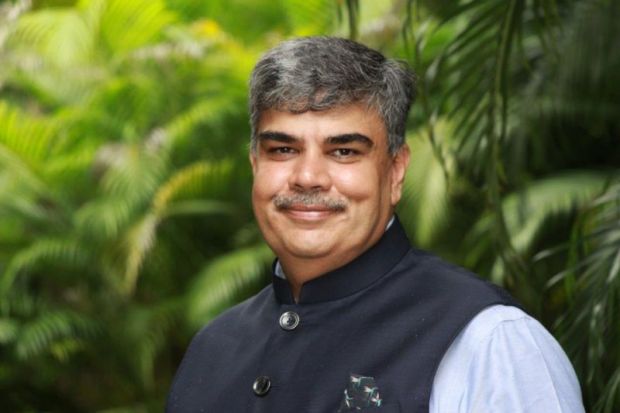While many scholars see business and academia as separate and contrasting spheres, Dishan Kamdar is among a minority of university leaders who navigate comfortably between the two worlds. Having begun his career as an assistant professor at the Indian School of Business, his mission is to ground his students in both.
In the latest in our Talking Leadership series, Kamdar told Times Higher Education how he applies some of his business know-how to running a university.
From a business perspective, he has already succeeded in a key metric: growth.
Since he joined in 2018 as vice-chancellor at FLAME University – a private institution located in Pune, India, which includes liberal arts education as well as a business school – student numbers have more than doubled. This year, FLAME welcomes an incoming class of about 650 students, bringing its total student body to roughly 1,800. Faculty numbers have seen a similar increase, to 147 members.
“We’ve become an aspirational destination in the liberal arts [undergraduate] space…and we’re continuing to hire. We’re extremely selective, having demonstrated research is one of our primary criteria along with evidence of good teaching,” he says.
But for Kamdar, larger student and faculty sizes are a means rather than an end goal.
While he is pleased with the institution’s recent expansion, he is wary of pursuing growth at the cost of quality. As FLAME has gotten bigger, Kamdar has been careful to increase faculty numbers before deciding how many more students it was able to take on. He emphasises, “we are not for profit…we’ll not do anything that will hurt student experience.”
Above all, he says he is proud of creating “a culture of humility, of respect and accountability”, something that begins with himself.
A culture of communication
When he stepped into his current role at FLAME, his first act was to meet with all of his faculty one-on-one. Among the academics and throughout different departments, he tries to impart the feeling that “no one is big and no one is small”. Four years on, he encourages academics to visit his office, believing that “culture is the secret sauce, and a happy workforce is a productive workforce”.
Some might find him a bit talkative, he jokes. “I don’t only communicate – I over-communicate, probably my academics and staff colleagues would complain, but the aim is to talk.”
He has also reshaped the university leadership team, creating more positions for associate and assistant deans who would “take charge of particular facets of university growth”, something he believes empowers his faculty and staff.
So far, his approach seems to be working. For the past three years, FLAME has been certified a “great place to work” by the India-based consultancy also called Great Place To Work, something that he says “speaks volumes about the culture of the university”.
During his tenure, FLAME University’s publication output has also grown, more than quadrupling, reflecting his view that “we cannot just be knowledge disseminators, [we] have to be knowledge creators, otherwise we’ll be teaching what is obsolete”.
Given the emphasis on academic publications, how does he ensure his faculty maintain a balance between teaching and research?
“The incentives are very transparent and very much aligned. If you’re a great teacher and you do not want to publish and say, ‘I just want to teach’, we have a separate track for that,” he says, adding that the opposite is also true.
Faculty who are highly research active – “publishing machines”, he laughs – can get a teaching waiver. The arrangement ensures that “unhappiness is curtailed”, with clear objectives for either path.
His students, though, are required to demonstrate a solid foundation in research in order to graduate. Under Kamdar’s leadership, the university has embedded an analytical research component into every discipline.
As part of their experience at the university, students must go through several “immersions”. At the end of their first year, they spend a month working for a non-profit organisation. In their second year, they are required to complete a nine-month intensive project, working in small groups to study a nuance of India’s culture or history. They spend 10 days collecting primary data and conducting interviews, which they later turn into a dissertation. Finally, they complete a two-month internship at a company, which is graded and counts as course credit.
With the university in a frenzy of pre-autumn planning, Kamdar is eyeing up more ways to boost FLAME’s academic offerings. He aims to strengthen newly launched programmes, such as its master’s in economics and its PhD programme, as well as its soon-to-start master’s in psychology. Kamdar is also looking into more majors, including a major in design.
But the focus on academic rigour doesn’t mean Kamdar wants university life to be all work and no play. Before Covid put a stop to in-person events, he began a series of “Thank Goodness It’s Friday” game afternoons for staff and faculty to get together and have fun – and, importantly, “break silos”.
Kamdar is also keen on providing plenty of opportunities for students to mingle outside the classroom. The number of student sports, development and cultural clubs has also grown from 34 to nearly 55, with the campus “buzzing” on many evenings.
“They don’t realise this is something that adds to their life skills,” he says.
Kamdar’s promotion of extracurriculars stems from his belief in a well-rounded education, something he has learned is equally valuable in business and academia.
Mentoring
When he began his career as an assistant professor at the Indian School of Business’ executive education and postgraduate programme, he would share his mobile number with students at the end of the course.
“I’d say, if you ever need to talk, if life hits you hard, call me. I’ve been doing that for 15 years, and on average I get two to three calls per week, most related to managing adversity in the workplace and workplace politics,” he says.
It was this mentoring that initially got him thinking about improving undergraduate education in India. “I wish all my students had the benefit of a holistic education – they’d probably manage adversity better.”
In steering FLAME, Kamdar has also absorbed lessons from his first academic home, the National University of Singapore, which became his model for organisational structure, with each department inside the university “like an entrepreneurial unit within a larger organisation”. As a student there, Kamdar also saw how important it is for academics to have access to the resources they need.
“It’s about…getting your requests turned around quite swiftly. In some institutions, bureaucracy takes so much time that you’d rather not use that money,” he says.
While at NUS, he also saw how faculty had the freedom to decide what they wanted to teach and were given right of refusal instead of being forced to teach a class – a principle he has put into place at FLAME.
“If you want teachers to make a difference in class, you need them to be happy. A happy teacher will be more engaging,” he says.
International attraction
Having created an environment where faculty appear to thrive, his goal now is to make his campus an international attraction As the world recovers from pandemic-related travel disruptions, Kamdar wants FLAME to become the “sabbatical capital” of India, drawing scholars from other nations.
“We would want as many faculty from around [the] world to visit us and work with our faculty,” he says. “That’s something we want to pursue ASAP, allowing our faculty to travel and spend some time abroad with collaborators."
Speaking like the businessman he is, he adds, “Globalisation is on the cards.”
This is part of our “Talking leadership” series of 50 interviews over 50 weeks with the people running the world’s top universities about how they solve common strategic issues and implement change. Follow the series here.
Register to continue
Why register?
- Registration is free and only takes a moment
- Once registered, you can read 3 articles a month
- Sign up for our newsletter
Subscribe
Or subscribe for unlimited access to:
- Unlimited access to news, views, insights & reviews
- Digital editions
- Digital access to THE’s university and college rankings analysis
Already registered or a current subscriber? Login







